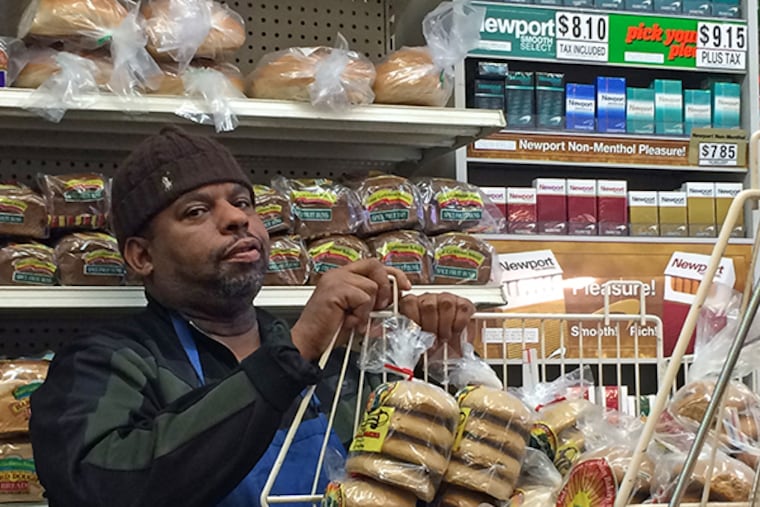Mixed reviews after two months of city's cigarette tax
Two months into its passage, the city's new cigarette tax is on track to generate $5 million more this year than expected for Philadelphia's public schools, while also causing subtle and significant shifts across the region.

Two months into its passage, the city's new cigarette tax is on track to generate $5 million more this year than expected for Philadelphia's public schools, while also causing subtle and significant shifts across the region.
Some city merchants hate the $2-a-pack hike, saying it is costing them customers. Public health experts are cheering it, saying it might lead some of the city's 275,000 smokers to quit - or encourage others to never start.
At least one guy said the tax was a blessing - because he sells loose cigarettes on a busy Center City street.
"People ain't buying packs, they're buying loose," said the salesman, who declined to give his name, as about 10 pedestrians in as many minutes paid him 50 cents a cigarette one day last week. "My business has tripled."
Through November, the new tax had generated $14.6 million, state officials said late last week. School administrators were encouraged by the higher-than-projected numbers, but remained wary of counting on the trend to continue.
"Since it's a new tax, we're definitely going to look at a couple more months of collection before we come out with any sort of revised estimates," said Matthew Stanski, the district's chief financial officer.
School officials had hoped to reap at least $49 million this fiscal year from the tax, which became a late-summer political football between city officials who said the money was critical to keep schools open and safe, and some midstate lawmakers who complained Philadelphia was getting unfair tax relief.
The legislators eventually relented.
But district officials say the tax hasn't solved all their problems. They are predicting an additional $71 million deficit in the next fiscal year, which starts in July.
And there has been fallout in other ways across the region.
Cigarette sellers near the city limits appear to be particularly hard hit.
All Wawa stores in the city have seen a decline in business, a spokeswoman said, but the drop in customers at border stores since the tax went into effect has been pronounced - with some reporting up to 20 percent fewer customers.
At the same time, spokeswoman Lori Bruce said, there has been an uptick in business at stores just outside city limits, where prices are closer to $7 per pack rather than $9.
And the people whose columns of carcinogenic vapor are keeping the school district's finances afloat?
They're a little resentful.
"Smoking is bad for you," said Joe Steiner, of Port Richmond, as he bought a pack of Newports at Dollar Global Food Mart on Allegheny Avenue. "It shouldn't have anything to do with education."
Plenty in the city seem determined to deny the city the rewards of taxing their vice. They're cutting back, buying cheaper brands, or buying cigarettes out of town.
"I have not bought one pack since it went up," said Dorothy Longo, a Port Richmond resident, who says she'll now buy her smokes near her office in Bensalem, Bucks County.
On Friday, Craig Brooks came from North Philadelphia to a Wal-Mart in Cheltenham to buy his Newport 100s.
"It beats spending $9.15 in the city," he said, "if you can spend $6.75 here."
About two blocks away in Mount Airy, an employee at Pat's Caribbean Market said the store has lost more than half of its cigarette business since the tax went into effect.
"They used to just go," Travis Leslie said, indicating a full rack of cigarettes behind the counter. "Now they just sit."
Store owners say there's a very thin profit margin in selling smokes - about 50 to 75 cents a pack - but they do miss the revenue from the other items smokers tend to buy while feeding their habit.
While the merchants mourn, health-care professionals are hopeful the cigarette tax might save lives.
The state and school district projected the city's cigarette sales would probably decline 10 million to 14 million packs a year as a result of the tax, according to the state Department of Revenue.
The city Department of Health projected the tax would lead to 40,000 fewer adult smokers and 2,000 fewer youth smokers. After the tax went into effect, the department said, calls to the PA Free Quitline doubled in a month.
And at the University of Pennsylvania's Comprehensive Smoking Treatment Program, more clients have listed the cost of smoking as a motivator to quit since the tax was levied, said Frank Leone, the program's director.
He was concerned, though, that because more poor people smoke, the hike in cigarette prices was creating an additional financial burden for people who might not be able to shake their addiction.
"On one hand, I'm a doctor, so I want the best health outcomes for people. And one side of my brain is saying the extra couple of bucks per pack is a good thing," Leone said. "On the other hand, I recognize smoking to be an addiction, and I watch as people suffer to try to be able to quit, not be able to, and also suffer the price increase."
Leone said he hoped the city would invest in services to help those who were more open to quitting because of the tax - just as school officials hoped the revenue would keep pouring in and as city merchants hope the tax would just go away.
Others took a longer view of the changes. At Port Richmond's Dollar Global, business has been largely unaffected, store clerks said.
"They complain about the prices, everybody does," said clerk Bianca Zayas, "but they still come in."